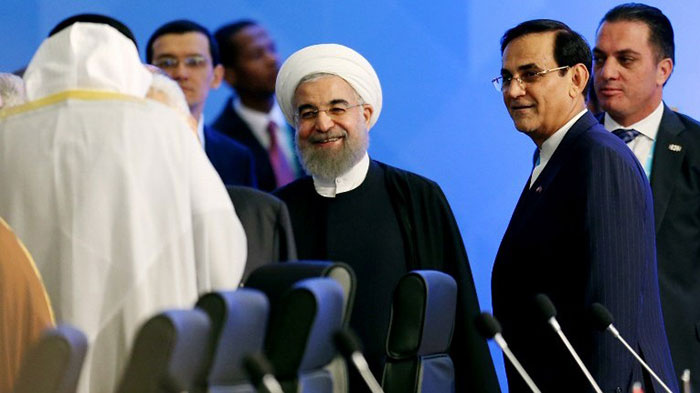Amid Hostilities, How Can Iran Handle Regional Crises?
In an article published by the Persian service of Iranian Diplomacy, university professor Mohammad-Mahdi Mazaheri writes that on

From the 1979 Islamic Revolution on to a few years ago, Israel and the United States remained Iran’s two main enemies in regional and international levels, establishing Iranophobia and imposing sanctions against the country in order to control Iran’s power in the region. In the wake of the 9/11 attacks, the US invasion of Afghanistan and Iraq, its involvement in fruitless attrition warfare, and the replacement of the Republicans with Democrats, the United States gradually reached the conclusion that direct military intervention in the Middle East has huge costs but little benefits for them. As a result, the Obama administration tried to resolve post-Iraq-war crises through diplomatic solutions rather than military ones.
It was then that countries in the region, previously enjoying ‘free rides’ from US interventions, lost temper and spared no effort to convince the US to continue its traditional role in the Middle East. The Zionist Regime [of Israel], Arab countries of the Persian Gulf, and Turkey were Iran’s main rivals who sensed danger with the US’ shift of policy and each tried to adopt a strategy to control Iran. In doing so, they put on their agenda Iran’s nuclear dossier as well as the resistance axis in Syria, Iraq, Lebanon and every other country with fighting Shiite forces including Bahrain and Yemen.
Israel and the Arab countries of the Persian Gulf closely focused on Iran’s nuclear program and tried to make it look dangerous in order to prevent an international agreement with Iran and, instead, bring the dossier to a conclusion with military invasion on the country. Turkey, for a while, demanded change in Syria’s power structure and joined the Arab countries of the Persian Gulf in their support of terrorist groups to oust Bashar Al-Assad. Furthermore, a sinister coalition was established between Israel and some Muslim Arab countries, particularly the Saudi Arabia, with its main mission being to sabotage the process in which Iran was gaining more and more power in the region.
Apart from the Zionist regime that has never been recognized by the Islamic Republic, hostilities on the part of regional rivals against Iran is rooted in ‘identity differences’ and the ‘difference in levels of power and interests’. This obsession with identity, historical humiliation and fear of Iran’s long-standing power in the region has always been with them since the establishment of these countries a few decades ago. Now, with changes in the region working to the advantage of Iran and the agreement with the West that resolved the nuclear dossier without war or bloodshed, the feeling has become more acute recently and is showing itself in the form of some audacious measures such as support of terrorism and warmongering.
With this being the case, what is a logical policy in response? How should the Rouhani administration, that has based its foreign policy on peaceful coexistence and détente with neighbors, counter these measures and developments? Several scenarios are imaginable. Scenario one is stubborn insistence of every side on its own values and interests which will finally end up in direct confrontation and war, as differences will gradually grow. Even though the Arab coalition in Yemen has demonstrated their inefficiency in war and Iran’s military capabilities is no secret, the breakout of another war in the tumultuous region will doubtlessly benefit no country in the region. The destruction of infrastructure and facilities will impose yet another period of economic and social crises on the countries involved.
A second scenario is one of pairings, with countries in the region seeking help from trans-regional powers to get them involved in regional confrontations. In this scenario, the US and Russia are the main trans-regional powers that will be called upon to tip scales up or down for regional powers. The scenario is reminiscent of the failed experience of the Cold War and has no long-term benefit but provides trans-regional powers with the opportunity to meddle in regional affairs.
Yet a more logical scenario to pursue is realistic regional solutions for regional crises, in the sense that the sides involved abandon their propagandist rhetoric and accept identity differences and the gap between interests in a realistic and pragmatic process. To maintain the long-term collective interests, they should avoid creating tension, threatening the interests of each other, and meddling in the domestic affairs of certain countries in the region. For this scenario to become operational, joint summits and face-to-face talks among regional leaders is essential. Nonetheless, preparing such an atmosphere of diplomacy and negotiation, participated by all rival powers in the region, requires a strategic understanding and political maturity, currently non-existent among leaders of Arab countries. Thus, the Iranian administration needs to take the necessary precautions and try to control the existing tensions with practical steps through potentials in the Organization of Islamic Cooperation or diplomatic capacities on the part of impartial countries in the international scene.

